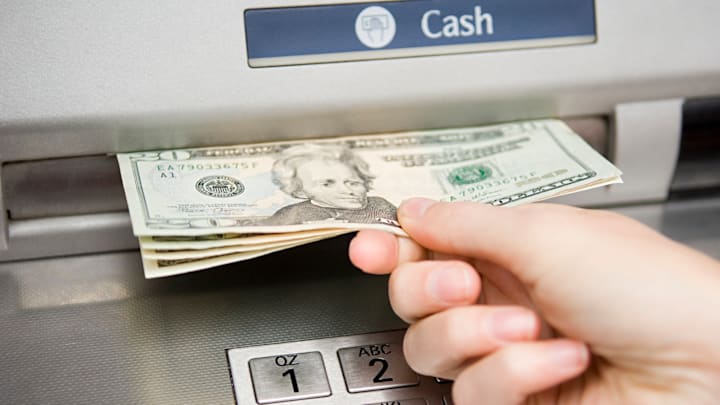There can be a particular kind of thrill associated with using an automatic teller machine, or ATM. A series of analog clunks counts and spits out cash into your hand. It’s like getting a casino payout at the slot machine, except you’re winning your own money.
The disappointment comes when you realize you’ve had to pay a surcharge to access that money. Sometimes those charges multiply. In 2023, the average ATM fee amount was $4.73. So why are we paying for the privilege of taking out money that already belongs to us?
The answer is twofold. If you’re going to an ATM that your bank considers out-of-network—meaning the machine is unaffiliated with the institution—then the private owner of that machine is looking to monetize it by collecting what’s known as an operator fee. That operator might also be the owner of the property where it’s located (maybe a gas station, bar, or other small business) or it might be an ATM operator who leases space. Either way, there’s no incentive for them to offer a fee-free transaction, especially when it costs them money to rent and maintain their ATM footprint.
Sometimes this can be a little manipulative. A bar, for example, might insist on cash-only transactions. On the one hand, the owner might want to avoid credit card transaction fees. On the other hand, they might conveniently have an ATM on the premises. Customers take out cash, pay a fee, and the owner collects it all.
But it’s not just the independent ATM operator: Your bank may also charge you their own fee for using a machine outside of their purview. One reason banks do this is to incite loyalty. They’d prefer you seek out their own locations for any and all transactions.
Read More Stories About Money Here:
The second source of fees is when banks charge a premium to use their own in-network ATMs. Sometimes this happens when you exceed a certain number of free transactions in a given month; other times, it’s simply because the bank is in a fee frenzy, tacking on charges for everything from cash withdrawals to overdraft penalties.
There’s no mystery why banks do this: They’re out to make money, and transaction fees help their bottom line. In the specific case of ATM surcharges, they might charge just enough to cover the cost of maintaining the machines.
Avoiding ATM Fees
If you’re bothered by ATM convenience fees, the easiest thing to do is establish a relationship with a bank that keeps transactions free. You also want to make sure they have ATM locations that are conveniently located. Sometimes this might mean switching banks, but if you find yourself in front of an ATM often, it would be worth the hassle.
Other times, banks will offer ATM fee reimbursement for out-of-network fees. These typically appear as credits on your monthly statement, though they might be capped. The bank might, for example, cover $20 of fees. If you incurred $30, you’re out $10.
Another strategy is to use the cash-back option at businesses like grocery stores. At checkout, you often have the choice of receiving cash without a fee when using your debit card.
If you have no choice but to use an ATM, you can try taking out more money at one time. Fees are typically per transaction and not based on any dollar amount, so taking out $20 or $200 incurs the same toll.
What Does ATM Stand For?
ATM stands for automatic teller machine. An early incarnation was dubbed the Bankograph in the 1960s, though obviously that failed to catch on. (The Bankograph only accepted deposits: dispensing cash came later.) Because machine is already in ATM, it doesn’t make much sense to call it an “ATM machine.”
The World’s Loneliest Wells Fargo ATM
It’s probably hard to feel sympathy for a machine, but there is something noble about the Wells Fargo ATMs in Antarctica’s McMurdo Station. The units service the small population of the research station in one of the most remote places on the globe. Fortunately, Wells Fargo considers it in-network. (We think.)
[h/t CNBC]
Have you got a Big Question you'd like us to answer? If so, let us know by emailing us at bigquestions@mentalfloss.com.
